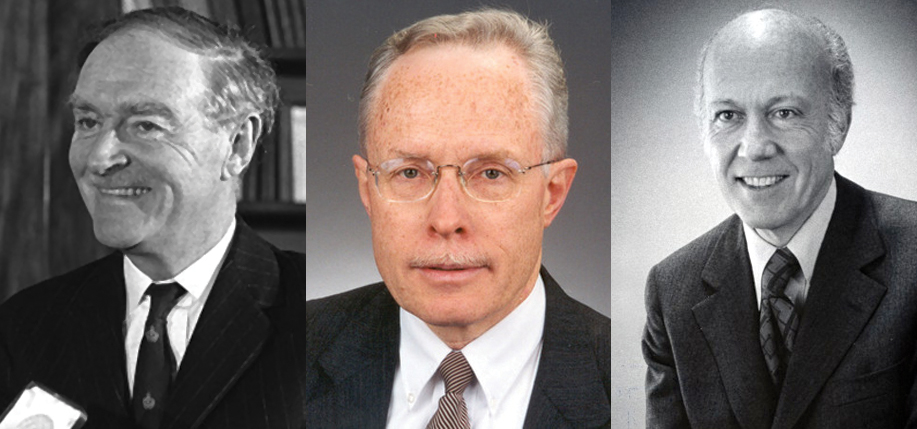Liam Cosgrave
1920 – 2017
Former prime minister of Ireland Liam Cosgrave died this past October at the age of 97 in Dublin. Cosgrave served as taoiseach from 1973 to 1977, during which time he was renowned for a firm stance against terrorism and for his skills as a diplomat. He is also remembered for his participation in the Sunningdale Agreement, a landmark negotiation in 1973 that is considered the primary stepping stone on the decades-long journey to the Good Friday Agreement.
The son of W.T. Cosgrave, first leader of the Irish Free State, Liam established his own impressive
career in Irish politics. He joined Fine Gael at the age of 17 and was elected to the Dáil Éireann just six years later, continuing to hold a position in the Irish government until 1981. His long career spanned several critical moments in Irish history, including the establishment of the nation as a republic in 1949 and its admission to the United Nations in 1955.
Taoiseach Leo Varadkar publicly lamented
Cosgrave’s loss in a speech delivered in the Dáil, Ireland’s parliament. “His entire life was in the service of the State, and he inspired so many with his quiet determination, courage and fortitude,” he said. Cosgrave is survived by children Mary, Liam, and Ciaran. His wife, Vera, died in 2016.
Jim Cullen
1945 – 2017
Jim Cullen, former president of Friends of Sinn Féin and prominent human rights lawyer most recently with the firm Anderson Kill, died in December at the age of 72. Cullen served as a U.S. Army general until 1996, when he retired as the Chief Judge of the U.S. Army Court of Criminal Appeals. Bearing a particular concern for Ireland and the rights of its people, Cullen was an essential force in helping to negotiate the Good Friday Agreement, and worked passionately to protect Irish
Republicans in America, while always encouraging an American awareness of Irish current events.
Born in Queens to Agnes Gorman of County
Offaly and Patrick Cullen of County Sligo, Cullen attributed his personal penchant for justice to his Irish-Catholic upbringing. He received his law
degree from St. John’s University in 1969, immediately after which he enlisted in the U.S. Army as a private and was deployed to Vietnam. Cullen told the Irish Times in 2015 that he was turned by the Irish Republic’s need for representation while on a trip to Northern Ireland in the late 1960s, after witnessing brutal treatment of the townspeople in
Coalisland, County Tyrone, by the Royal Ulster Constabulary.
In a statement, Sinn Féin president Gerry Adams recognized Cullen’s fierce attachment to Ireland: “He was born in New York but his heart was in
Offaly where his mother came from – and that bond remained ’til his death.” Cullen is survived by his partner, Catherine, children Tara, Kerry, Erin, and Sean, and eight grandchildren.
Lawrence O’Shaughnessy
1921 – 2017
Lawrence Milan O’Shaughnessy, a lifelong supporter of Irish studies programs in the United States, died in December at the age of 96. O’Shaughnessy was known most widely for his role as benefactor at the University of St. Thomas and St. Catherine University in St. Paul, Minnesota. Known as “Larry” to his friends, he was affectionately regarded for his commitment to the field of education and, specifically, to fostering an American understanding of the significance of Irish culture. He helped develop the Center for Irish Studies at the University of St. Thomas with Eoin McKiernan, a frequent contributor to this magazine.
O’Shaughnessy also backed the Irish American Cultural Institute in its nascent stages and served as associate editor of Éire-Ireland, the first journal to place a focus on Irish studies in the United States.
The great appreciation O’Shaughnessy, whose paternal grandfather was born in Limerick, had for the land of his ancestors was recognized in the 1960s with his nomination to the post of ambassador to Ireland by Senator Eugene McCarthy, though he turned down the position due to the illness of his wife, Bonnie. His respect for the field of humanities and Ireland’s contributions to it is reflected most
notably in the grant he created in 1996, the Lawrence O’Shaughnessy Award for Poetry, which annually endows a poet from Northern Ireland or the Republic of Ireland with a $5,000 prize for their work. O’Shaughnessy’s proud tradition of philanthropy was instilled by his father, Ignatius Aloysius O’Shaughnessy, founder of the largest independent oil refinery in the U.S. Lawrence carried on his
father’s legacy by continuing to support the University of St. Thomas, and expanded it in his efforts to improve the field of liberal arts.
In addition to his wife, he is survived by five sons and daughters, and 21 grandchildren and great-grandchildren. Speaking to the Twin Cities Pioneer Press, his daughter, Molly, said, “All our lives we knew that the mind and the love of learning was the most important thing in life.” ♦
Those We Lost


Liam Cosgrove is the first in the above list. As leader of the Fine Gael Party, Cosgrove became Taoiseach in 1973, when he replaced Jack Lynch, the Fianna Fáil leader. While Lynch held the position about 2 years earlier in early August of ’71, internment without charge or trial began in the North. During the 9th, 10th and 11th of that month, the Ballymurphy Massacre occurred, when soldiers of the British Parachute Regiment opened fire on Nationalists, at least 8 of whom were killed. These included Fr. HUGH MULLAN (38), Joan Connolly (50)), Henry Teggart, father of 14, Frank Quinn (19).